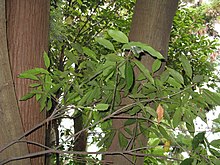
Quercus montana, the chestnut oak, is a species of oak in the white oak group, Quercus sect. Quercus. It is native to the eastern United States, where it is one of the most important ridgetop trees from southern Maine southwest to central Mississippi, with an outlying northwestern population in southern Michigan. It is also sometimes called rock oak because of its presence in montane and other rocky habitats. As a consequence of its dry habitat and ridgetop exposure, it is not usually a large tree, typically 18–22 m (59–72 ft) tall; occasional specimens growing in better conditions can however become large, with trees up to 40–43 m (131–141 ft) tall known. They tend to have a similar spread of 18–22 m (59–72 ft). A 10-year-old sapling grown in full sun will stand about 5 m (16 ft) tall. This species is often an important canopy species in an oak-heath forest.

Quercus alba, the white oak, is one of the preeminent hardwoods of eastern and central North America. It is a long-lived oak, native to eastern and central North America and found from Minnesota, Ontario, Quebec, and southern Maine south as far as northern Florida and eastern Texas. Specimens have been documented to be over 450 years old.

Quercus ilex, the evergreen oak, holly oak or holm oak, is a large evergreen oak native to the Mediterranean region. It takes its name from holm, an ancient name for holly. It is a member of the Cerris section of the genus, with acorns that mature in a single summer. Quercus rotundifolia was previously thought to be part of this species, but was later moved to its own.

Quercus glauca, commonly called ring-cupped oak or Japanese blue oak, is a tree in the beech family (Fagaceae). It is native to eastern and southern Asia, where it is found in Afghanistan, Bhutan, China, northern and eastern India, southern Japan, Kashmir, Korea, Myanmar, Nepal, and Vietnam.

Quercus engelmannii, the Engelmann oak or Pasadena oak, is a species of oak in the white oak section, native to southern California and northwestern Baja California, Mexico.

Quercus imbricaria, the shingle oak, is a deciduous tree in the red oak group of oaks. It is native primarily to the Midwestern and Upper South regions of North America, from southern New York west to northern Illinois and eastern Kansas, and south to central Alabama and Arkansas. It is most commonly found growing in uplands with good drainage, less often along lowland streams, at 100–700 m altitude.

Quercus lyrata, the overcup oak, is an oak in the white oak group. The common name, overcup oak, refers to its acorns that are mostly enclosed within the acorn cup. It is native to lowland wetlands in the eastern and south-central United States, in all the coastal states from New Jersey to Texas, inland as far as Oklahoma, Missouri, and Illinois. There are historical reports of it growing in Iowa, but the species appears to have been extirpated there. It is a slow-growing tree that often takes 25 to 30 years to mature. It has an estimated lifespan of 400 years.

Quercus faginea, the Portuguese oak, is a species of oak native to the western Mediterranean region in the Iberian Peninsula and the Balearic Islands. Similar trees in the Atlas Mountains of northwest Africa are usually included in this species, or sometimes treated as a distinct species Quercus tlemcenensis. It occurs in mountains from sea level to 1900 m altitude, and flourishes in a variety of soils and climates.

The Japanese wood pigeon is a species of bird in the genus Columba in the family Columbidae. It is found along shorelines of the East China Sea. They are believed to be the largest representative of Columba, at 550 grams (1.2 lb) and 43 cm (17 in). Its natural habitats are temperate forests and subtropical or tropical moist lowland forests. The species is in decline owing to habitat loss, habitat degradation, deforestation and hunting. This wood pigeon is endemic to the laurel forest habitat.
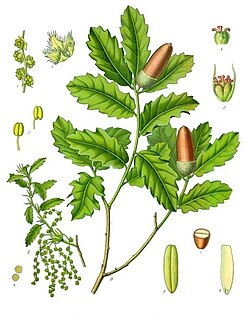
Quercus lusitanica, commonly known as gall oak, Lusitanian oak, or dyer's oak, is a species of oak native to Portugal, Spain and Morocco. Quercus lusitanica is the source of commercial nutgalls. These galls are produced by the infection from the insect Cynips gallae tinctoriae. They are used for dyeing.

Quercus myrsinifolia is an Asian species of tree in the ring-cupped oaks subgenus of the family Fagaceae. It has several common names, including bamboo-leaf oak, Chinese evergreen oak, and Chinese ring-cupped oak. Its Chinese name is 小叶青冈; pinyin: xiǎo yè qīng gāng, which means little leaf ring-cupped oak, in Japan it is called white oak and in Korea it is known as gasinamu (가시나무). It is native to east central and southeast China, Japan, Korea, Laos, northern Thailand, and Vietnam.

Quercus pagoda, the cherrybark oak, is one of the most highly valued red oaks in the southern United States. It is larger and better formed than southern red oak and commonly grows on more moist sites. Its strong wood and straight form make it an excellent timber tree. Many wildlife species use its acorns as food, and cherrybark oak makes a fine shade tree. Cherrybark oak was formerly considered to be a subspecies of southern red oak, Quercus falcata, subsp pagodifolia.

Quercus cornelius-mulleri is a North American species of oak known by the common name Muller oak, or Muller's oak. It was described to science in 1981 when it was segregated from the Quercus dumosa complex and found to warrant species status of its own. It was named after the ecologist Cornelius Herman Muller. It is native to southern California and Baja California, where it grows in chaparral, oak woodlands, and other habitat in foothills and mountains. It can most easily be observed in Joshua Tree National Park and in the woodlands along the western margins of the Colorado Desert in San Diego County, California.

Quercus turbinella is a North American species of oak known by the common names shrub oak, turbinella oak, shrub live oak, and gray oak. It is native to Arizona, California, New Mexico, Utah, Colorado, and Nevada in the western United States. It also occurs in northern Mexico.

Quercus arizonica, the Arizona white oak, is a North American tree species in the beech family. It is found in Arizona, New Mexico, western Texas, Sonora, Chihuahua, Coahuila, Sinaloa, and Durango.
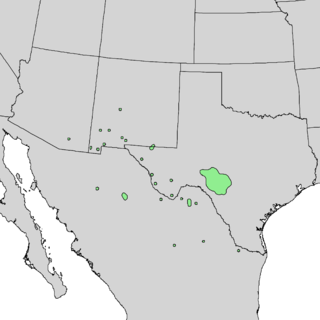
Quercus pungens, commonly known as the sandpaper oak or scrub oak, is a North American species evergreen or sub-evergreen shrub or small tree in the white oak group. There is one recognised variety, Quercus pungens var. vaseyana, the Vasey shin oak. Sandpaper oak hybridizes with gray oak in the Guadalupe Mountains of New Mexico and Texas.

Quercus mohriana, commonly known as the Mohr oak, shin oak or scrub oak, is a North American evergreen shrub or small tree in the white oak group and is native to the south-central United States and north-central Mexico. The species epithet mohriana honors the pharmacist and botanist Charles Mohr of Alabama.
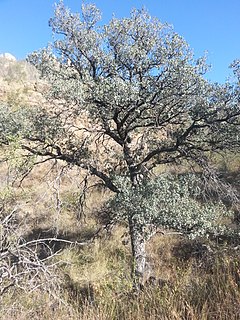
Quercus oblongifolia, commonly known as the Arizona blue oak, Blue live oak or Sonoran blue oak, is an evergreen small tree or large shrub in the white oak group.

Quercus grisea, commonly known as the gray oak, shin oak or scrub oak, is a North American species deciduous or evergreen shrub or medium-sized tree in the white oak group. It is native to the mountains of the southwestern United States and northern Mexico. It hybridizes with four other oak species where the ranges overlap, the Arizona white oak, the Gambel oak, the Mohr oak and the sandpaper oak.
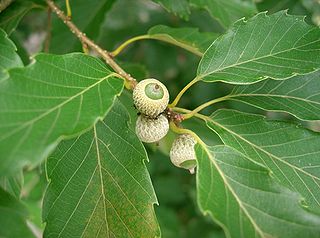
Quercus serrata, the jolcham oak, (Chinese: 枹栎; pinyin: bāolì, 小楢 is an East Asian species of tree in the beech family. It is native to China, Taiwan, Japan, and Korea.
